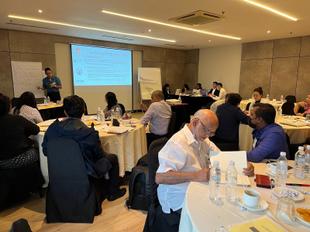Toward Worker-Driven Remedy
Electronics Watch is taking steps to develop and implement a worker-driven remediation methodology. The methodology will complement the worker-driven monitoring methodology, taking over at the point where harm to workers is reported. The idea is to develop an equally detailed method to drive improvements, including remedy for workers. Recent workshops in Copenhagen and Malaysia served to consult key stakeholders – namely public buyers, trade unions, civil society organisations and academics – on aspects of the methodology and its underlying principles, to ensure its relevance and utility.
We started by conducting legal research and analysis resulting in the publication, “Remedy For Human Rights Violations In Global Supply Chains.” Prepared by Martina Trusgnach and Olga Martin-Ortega of the Business, Human Rights, and the Environment Research Group at the University of Greenwich (BHRE), it establishes a framework for the remediation process and defines the outcomes of remedy according to international human rights law. Following two consultations with trade unions and civil society organisations in Malaysia in May and November 2022, we distilled the framework into a set of principles of worker-driven remedy. Participants included IndustriALL, the global union, and its affiliates; UNISON, the UK public sector union; Tenaganita, Electronics Watch monitoring partner in Malaysia; Serve the People Association, our monitoring partner in Taiwan; and other Malaysian civil society organisations.
In parallel, together with the Danish Institute for Human Rights and BHRE, Electronics Watch organised a two-day training and workshop on access to remedy and remediation for human rights abuses in public procurement. Participants included public buyers and procurement professionals from local, regional, national, and international bodies. Drawing on real labour rights cases and video testimonials from workers and their advocates, participants identified challenges to and opportunities for driving remedy for rights violations in global supply chains through public procurement. The resulting ideas provide a basis for developing a roadmap for change. These included remedy-specific award criteria, a guide for engaging suppliers on remedy, further workshops and trainings for public buyers, and a platform for information sharing on remedy-related best practices, among others.
This work will continue in 2023, starting with the finalisation of the principles for worker-driven remedy, further education and research, and supporting public buyers who put the ideas into practice.


